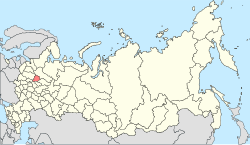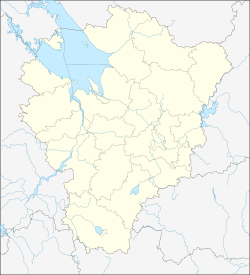Uglich
| Uglich (English) Углич (Russian) |
|
|---|---|
| - Town - | |
 Uglich in winter |
|
 Location of Yaroslavl Oblast in Russia |
|
|
|
|
|
|
|
|
|
|
| Administrative status (as of December 2011) | |
| Country | Russia |
| Federal subject | Yaroslavl Oblast |
| Administratively subordinated to | town of oblast significance of Uglich |
| Administrative center of | Uglichsky District, town of oblast significance of Uglich |
| Municipal status (as of December 2011) | |
| Municipal district | Uglichsky Municipal District |
| Urban settlement | Uglich Urban Settlement |
| Administrative center of | Uglichsky Municipal District, Uglich Urban Settlement |
| Mayor | Eleanora Sheremetyeva |
| Representative body | Municipal Council |
| Statistics | |
| Area | 26.6 km2 (10.3 sq mi) |
| Population (2010 Census) | 34,507 inhabitants |
| Density | 1,297/km2 (3,360/sq mi) |
| Time zone | MSK (UTC+03:00) |
| Founded | 937 or 1148 |
| Postal code(s) | 152610 |
| Dialing code(s) | +7 48532 |
|
|
|
| on | |
Uglich (Russian: Углич; IPA: [ˈuɡlʲɪtɕ]) is a historic town in Yaroslavl Oblast, Russia, which stands on the Volga River. Population: 34,507 (2010 Census);38,260 (2002 Census);39,975 (1989 Census).
A local tradition dates the town's origins to 937. It was first documented in 1148 as Ugliche Pole (Corner Field). The town's name is thought to allude to the nearby turn in the Volga River.
Uglich had been the seat of a small princedom from 1218 until 1328 when the local princes sold their rights to the great prince of Moscow. As a border town of the Grand Duchy of Moscow, it was burned several times by Lithuanians, Tatars, and the grand prince of Tver.
Grand Duke Ivan III of Moscow gave the town to his younger brother Andrey Bolshoy in 1462. During Andrey's reign, the town was expanded and first stone buildings were constructed. Particularly notable were the cathedral (rebuilt in 1713), the Intercession Monastery (destroyed by the Bolsheviks) and the red-brick palace of the prince (completed in 1481 and still standing).
During the reign of Ivan the Terrible, the town passed to his only brother, Yury. Local inhabitants helped the Tsar capture Kazan by building a wooden fortress which was transported by the Volga all the way to Kazan. Throughout the 16th century, Uglich prospered both politically and economically, but thereafter its fortunes began to decline.
...
Wikipedia



